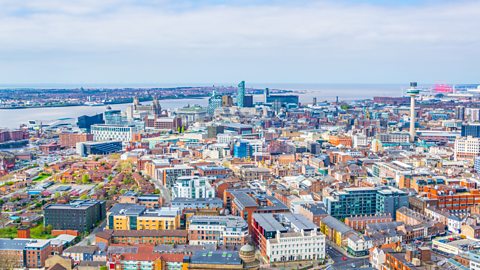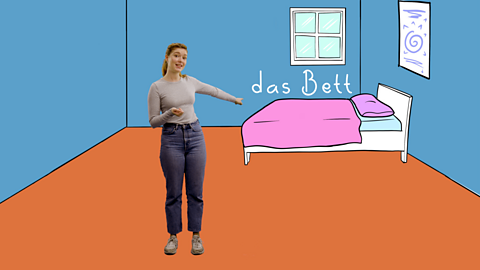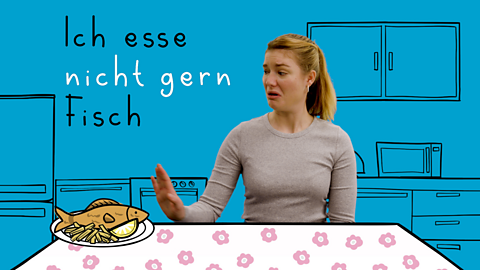Talking about where you live in German
Wo wohnst du? - Where do you live?
Wohnst du in einem Haus oder in einer Wohnung? - Do you live in a house or a flat?
Ich wohne in einem Haus in einer Stadt. - I live in a house in a town.
Ich wohne in Yorkshire. - I live in Yorkshire.
And what about your town? What’s that like? Wie ist deine Stadt?
Meine Stadt ist ziemlich klein. - My town is quite small.
Meine Stadt ist sehr lebendig. - My town is very lively.
If you want to say what there is in your town you say es gibt - 'there is' or 'there are'.
Es gibt ein Einkaufszentrum, einen Bahnhof und ein Fitnessstudio in meiner Stadt. - There’s a shopping centre, a train station and a gym in my town.
So if you want to describe your house and town, ich wohne - 'I live', and es gibt - 'there is', are really useful phrases.
To talk about where you live, use the verb wohnen. You need to conjugate it depending on who you are talking about:
| Pronoun | Verb ending | Example |
|---|---|---|
| ich | -e | ich wohne - I live |
| du | -st | du wohnst - you live |
| er | -t | er wohnt - he lives |
| sie | -t | sie wohnt - she lives |
To ask, where do you live? say wo wohnst du?
To reply, you can say:
- Ich wohne in einem Haus - I live in a house.
- Ich wohne in einer Wohnung - I live in a flat.

You can also talk about what kind of area you live in:
- Ich wohne in einer Stadt - I live in a town.
- Ich wohne in einem Dorf - I livein a village.
- Meine Tante wohnt in einer GroĂźstadt - My aunt lives in a city.
- Mein Opa wohnt auf dem Land - My grandad lives in the countryside.

Look at the vocabulary below. Can you talk about where you live?
| German | English |
|---|---|
| ich wohne | I live |
| in einem Haus | in a house |
| in einem Cottage | in a cottage |
| in einem Bungalow | in a bungalow |
| in einer Wohnung | in a flat |
| in einer Stadt | in a town |
| in einer GroĂźstadt | in a city |
| in einem Dorf | in a village |
| auf dem Land | in the countryside |
| an der KĂĽste | on the coast |
Describing your local area
You can use intensifiers like sehr (very), ein bisschen (a bit), ziemlich (quite) and adjectives to add more detail to what you are saying.
- Meine Stadt ist sehr ˛µ°ů´ÇĂź - My town is very big.
- Mein Dorf ist ziemlich ruhig und ein bisschen langweilig - My village is quite quiet and a bit boring.
| German | English |
|---|---|
| ˛µ°ů´ÇĂź | big |
| klein | small |
| laut | loud |
| ruhig | quiet |
| langweilig | boring |
| historisch | historical |
| industriell | industrial |
| touristisch | touristy |
| umweltfreundlich | environmentally friendly |
| es gibt viel zu tun | there is lots to do |
What is there in your town?
Use the vocabulary in the slideshow below to say what is in your town.

Image caption, der Supermarkt - the supermarket
1 of 8
You can use the phrase es gibt (there is/are) to say what is in your town. Make sure the article before the noun matches the noun’s gender - einen (masculine), eine (feminine) or ein (neuter).
- Es gibt einen Bahnhof in meiner Stadt - There is a train station in my town.
- Es gibt einen Supermarkt und ein Kino in meiner Stadt - There is a supermarket and a cinema in my town.
To say your town does not have something, change the article to keinen (masculine), keine (feminine) or kein (neuter).
- Es gibt keinen Park in meiner Stadt - There is not a park in my town.
- Es gibt kein Schwimmbad in meiner Stadt - There is not a swimming pool in my town.
If you start the sentence with the phrase in meiner Stadt (in my town), then say gibt es, because the verb has to be the second idea in the sentence.
- In meiner Stadt gibt es einen Bahnhof - In my town there is a train station.
- In meiner Stadt gibt es einen Supermarkt und ein Kino - In my town there is a supermarket and a cinema.
For more vocabulary to describe where you live, click on the downloadable below.

Comparing towns
To compare one area to another, you can use comparative adjectives. These work in a similar way to English and usually add -er on the end.
- Liverpool ist kleiner als London - Liverpool is smaller than London.
- Snowdonia ist ruhiger als Cardiff - Snowdonia is quieter than Cardiff.
- München ist schöner als Frankfurt - Munich is prettier than Frankfurt.
As an exception, some comparative adjectives take an umlaut:
- Birmingham ist größer als Coventry - Birmingham is bigger than Coventry.
Quiz
Find out how much you know about describing where you live in German in this short quiz!
Game - FestiLingo: German. game
Visit the festival and practise German language skills in this game

More on Topics
Find out more by working through a topic
- count8 of 9

- count9 of 9

- count1 of 9
